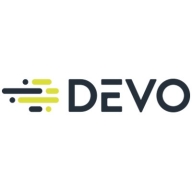

IBM Security QRadar and Devo compete in the advanced SIEM solutions category, providing comprehensive features for security operations. Based on the comparisons, Devo has an edge in high-speed search capabilities and real-time analytics.
Features: QRadar offers customization, scalability, and wide array integrations, including vulnerability management and threat intelligence. It is also recognized for robust log analysis and real-time alerts through Watson integration. Devo excels with high-speed search, real-time analytics, and its Activeboards feature, which allows for easy custom dashboard creation and extensive data retention capabilities.
Room for Improvement: QRadar could benefit from a more intuitive interface and enhanced integration with third-party solutions. Areas like rule creation and user-friendly analytics need development. Devo could improve its GUI, increase native data parsers, and offer more pre-built monitoring capabilities. Enhancements in alerting and notification features are suggested, along with revisiting the data ingestion pricing model.
Ease of Deployment and Customer Service: QRadar is versatile, offering on-premises, cloud, and hybrid deployment options, which suit large enterprises needing customization. However, customer service is inconsistent, with room for improved support responsiveness and expertise. Devo, with public and hybrid cloud deployments, is noted for ease of use and quick time-to-value, though service speed and support depth improvements are suggested. Devo’s intuitive interface simplifies deployment for organizations of all sizes.
Pricing and ROI: QRadar is often considered expensive compared to competitors, with a comprehensive feature set but potentially less appealing to small businesses due to cost. Its event-based pricing may lead to a complex licensing structure, but users report substantial ROI via threat mitigation. Devo provides pricing transparency with costs based on data ingestion, offering an edge with a straightforward pricing model and significant value with 400 days of hot data retention as standard, appealing to businesses seeking flexible costs and high data availability.
With SOAR, the workflow takes one minute or less to complete the analysis.
AWS gives the chance to implement a solution out of the box with use cases that are already in IBM Security QRadar.
I have seen a return on investment; I can share that it includes time saved, money saved, and fewer employees needed.
They assist with advanced issues, such as hardware or other problems, that are not part of standard operations.
Support needs to understand the issue first, then escalate it to the engineering team.
The support is really good; for instance, if a critical ticket is submitted, you will get paged right away as it gets logged, and their analyst will look into it, letting you know as soon as possible so you can work on it.
For EPS license, if you increase or exceed the EPS license, you cannot receive events.
IBM Security QRadar's scalability is great; you can have a new collector to deploy if you have increased EPS per second.
On cloud, you don't see any disconnections or instability.
I think QRadar is stable and currently satisfies my needs.
The product has been stable so far.
This is particularly evident when dealing with failed login attempts and determining true versus false positives.
We receive logs from different types of devices and need a way to correlate them effectively.
If AI-related support can suggest rules and integrate with existing security devices like MD, IPS, this SIM can create more relevant rules.
IBM Security QRadar does not support Canvas, so we had to create custom scripts and workarounds to pull logs from Canvas.
Splunk is more expensive than IBM Security QRadar.
It was costly mainly because of the value you can get right now compared to other solutions.
It depends on how much you want to spend.
When they see a spike in a line chart for a failed login, which could be a true or false attempt, they can click that spike, and a table widget on the same active board instantly populates with raw logs of data for those specific failed logins.
Recently, I faced an incident, a cyber incident, and it was detected in real time.
IBM Security QRadar gives the opportunity to improve the time to market of the releases with a great evaluation of cybersecurity breaches.
Compared to ArcSight, Splunk, or any other SIEM tools where you need their processing language such as structured query language, SPL, and in Sentinel there is KQL query languages, IBM Security QRadar doesn't require reliance on query languages.
| Product | Market Share (%) |
|---|---|
| IBM Security QRadar | 5.6% |
| Devo | 1.1% |
| Other | 93.3% |

| Company Size | Count |
|---|---|
| Small Business | 8 |
| Midsize Enterprise | 4 |
| Large Enterprise | 11 |
| Company Size | Count |
|---|---|
| Small Business | 89 |
| Midsize Enterprise | 38 |
| Large Enterprise | 105 |
Devo is the only cloud-native logging and security analytics platform that releases the full potential of all your data to empower bold, confident action when it matters most. Only the Devo platform delivers the powerful combination of real-time visibility, high-performance analytics, scalability, multitenancy, and low TCO crucial for monitoring and securing business operations as enterprises accelerate their shift to the cloud.
IBM Security QRadar (recently acquired by Palo Alto Networks) is a security and analytics platform designed to defend against threats and scale security operations. This is done through integrated visibility, investigation, detection, and response. QRadar empowers security groups with actionable insights into high-priority threats by providing visibility into enterprise security data. Through centralized visibility, security teams and analysts can determine their security stance, which areas pose a potential threat, and which areas are critical. This will help streamline workflows by eliminating the need to pivot between tools.
IBM Security QRadar is built to address a wide range of security issues and can be easily scaled with minimal customization effort required. As data is ingested, QRadar administers automated, real-time security intelligence to swiftly and precisely discover and prioritize threats. The platform will issue alerts with actionable, rich context into developing threats. Security teams and analysts can then rapidly respond to minimize the attackers' strike. The solution will provide a complete view of activity in both cloud-based and on-premise environments as a large amount of data is ingested throughout the enterprise. Additionally, QRadar’s anomaly detection intelligence enables security teams to identify any user behavior changes that could be indicators of potential threats.
IBM QRadar Log Manager
To better help organizations protect themselves against potential security threats, attacks, and breaches, IBM QRadar Log Manager gathers, analyzes, preserves, and reports on security log events using QRadar Sense Analytics. All operating systems and applications, servers, devices, and applications are converted into searchable and actionable intelligent data. QRadar Log Manager then helps organizations meet compliance reporting and monitoring requirements, which can be further upgraded to QRadar SIEM for a more superior level of threat protection.
Some of QRadar Log Manager’s key features include:
Reviews from Real Users
IBM Security QRadar is a solution of choice among users because it provides a complete solution for security teams by integrating network analysis, log management, user behavior analytics, threat intelligence, and AI-powered investigations into a single solution. Users particularly like having a single window into their network and its ability to be used for larger enterprises.
Simon T., a cyber security services operations manager at an aerospace/defense firm, notes, "The most valuable thing about QRadar is that you have a single window into your network, SIEM, network flows, and risk management of your assets. If you use Splunk, for instance, then you still need a full packet capture solution, whereas the full packet capture solution is integrated within QRadar. Its application ecosystem makes it very powerful in terms of doing analysis."
A management executive at a security firm says, "What we like about QRadar and the models that IBM has, is it can go from a small-to-medium enterprise to a larger organization, and it gives you the same value."
We monitor all Security Information and Event Management (SIEM) reviews to prevent fraudulent reviews and keep review quality high. We do not post reviews by company employees or direct competitors. We validate each review for authenticity via cross-reference with LinkedIn, and personal follow-up with the reviewer when necessary.